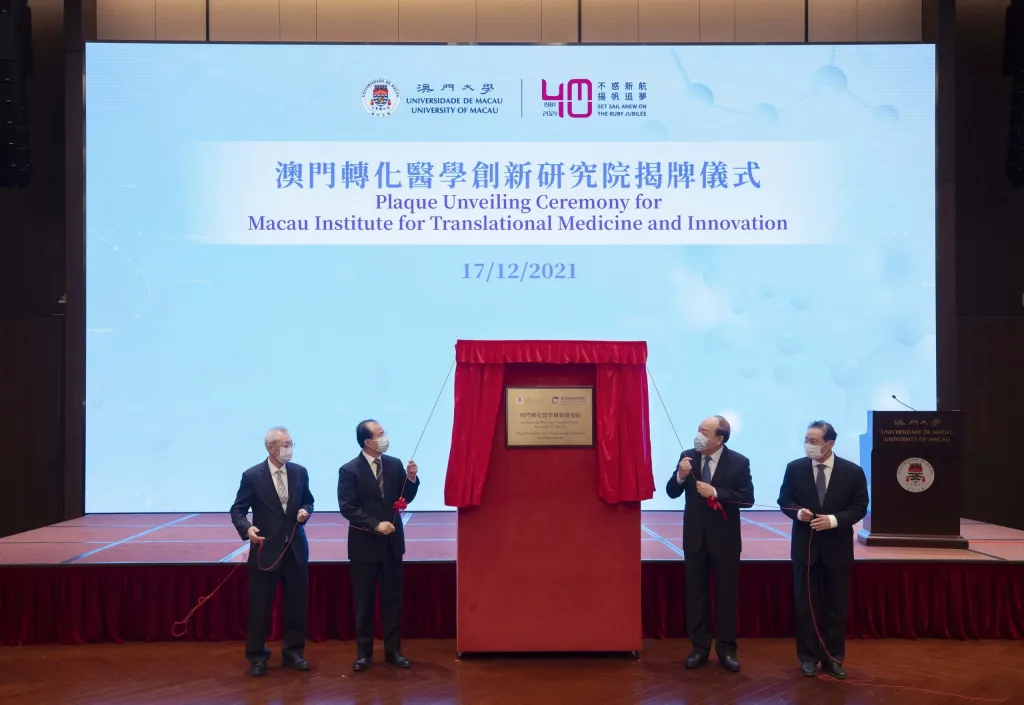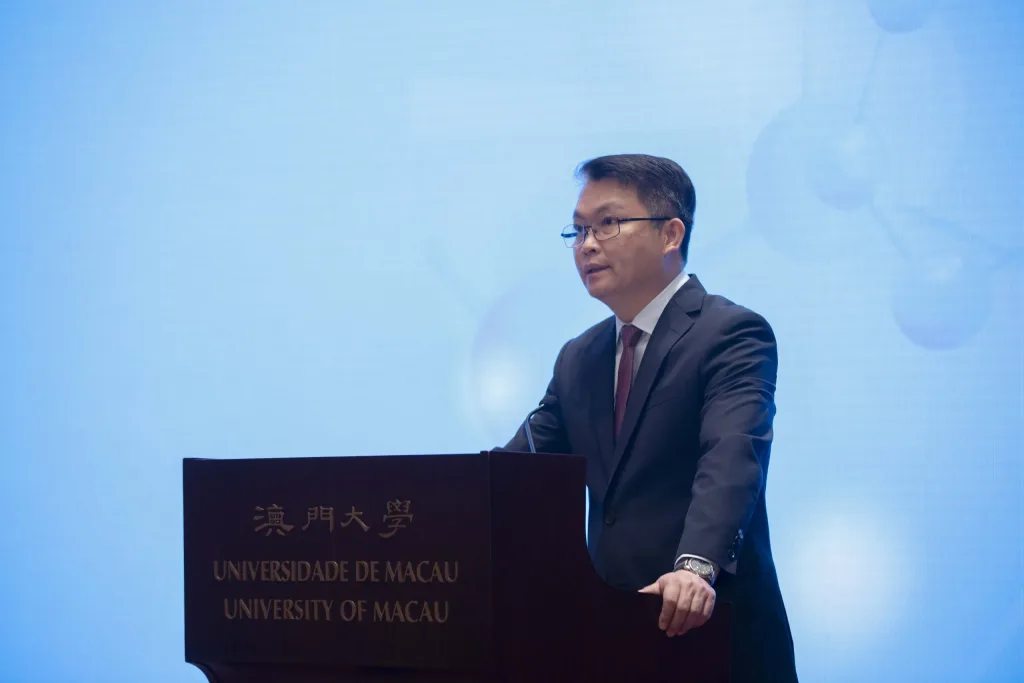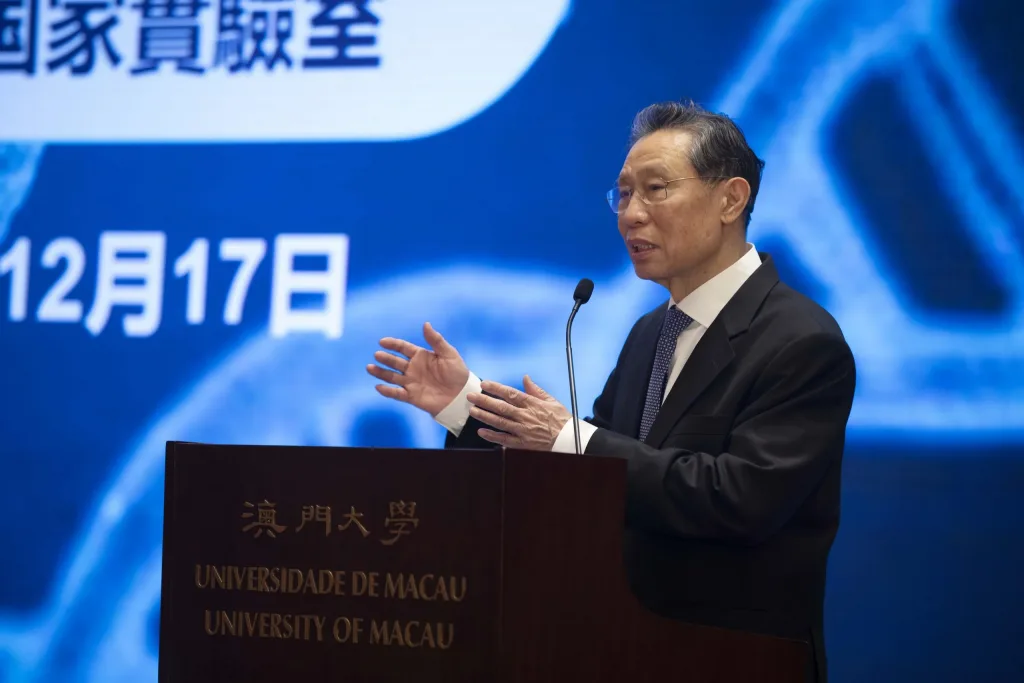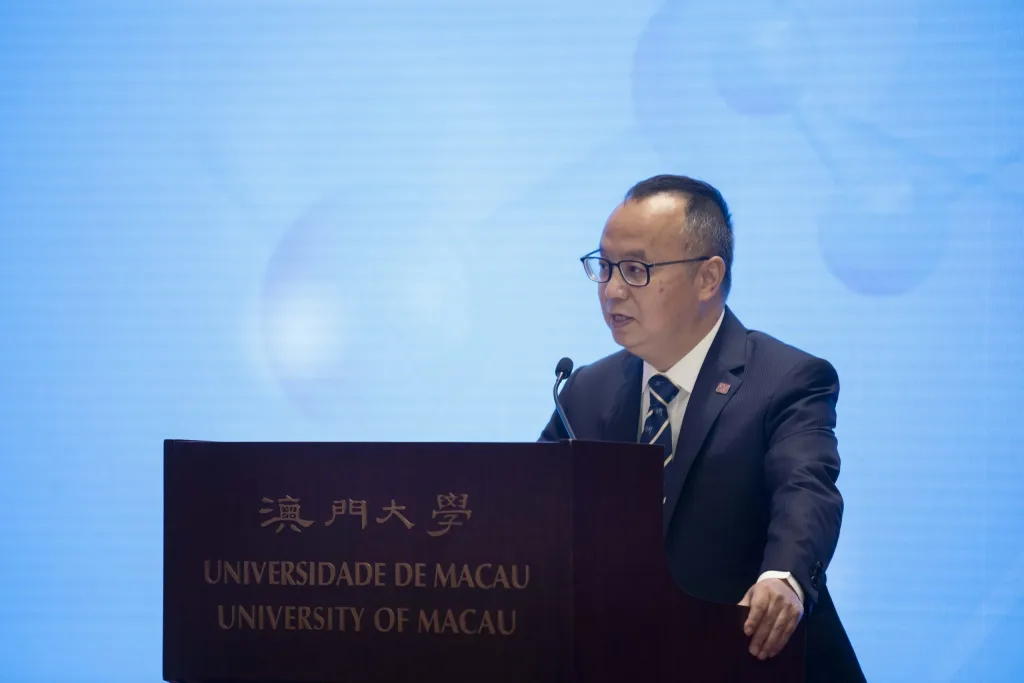The University of Macau (UM) held a plaque unveiling ceremony for the Macau Institute for Translational Medicine and Innovation today (17 December). Zhong Nanshan, member of the Chinese Academy of Engineering, director of the state key laboratory at Guangzhou Medical University, and director of the National Clinical Research Centre for Respiratory Disease of Guangzhou Medical University First Affiliated Hospital, serves as the president of the Institute’s Steering Committee. The Institute will efficiently promote innovation in medical science and technology, assist the university in commercialising its research results in the field of biomedicine, and enhance disease prevention and treatment in the Greater Bay Area, with developing innovative Chinese medicine-based drugs as its key mission. It will also integrate innovative technologies and human resources in the field of Chinese medicine and translational medicine in Macao and the mainland, to facilitate technology transfer and industrial development in Macao.
Macao SAR Chief Executive Ho Iat Seng, Director of the Liaison Office of the Central People’s Government in the Macao SAR Fu Ziying, Academician Zhong Nanshan, and UM’s University Council Chair Lam Kam Seng officiated at the plaque unveiling ceremony. Macao SAR Secretary for Economy and Finance Lei Wai Nong, academician Zhong Nanshan, and UM Rector Yonghua Song delivered speeches at the event.
According to Secretary Lei, the Institute will take the development of Chinese medicine and biomedicine as its key task during the initial stage, with an emphasis on supporting the development of Chinese medicine industry, especially the commercialisation of the research results of the State Key Laboratory of Quality Research in Chinese Medicine and other faculties of UM. The Institute will also look for and select outstanding research projects to provide support and services in the form of evaluation, incubation, training, and guidance.
Zhong raised several expectations for the Institute. He said: ‘I hope that the Institute will follow the chief executive’s instruction to “adhere to the principle of ‘one country’ and make good use of the advantages of ‘two systems’ to promote the development of new technologies, new industries, and new business and operation models. The Institute should also take advantage of the preferential policies for the Guangdong-Macao In-Depth Cooperation Zone in Hengqin and the Guangdong-Hong Kong-Macao Greater Bay Area and give full play to its role as a bridge between scientific research and industrial transformation, in order to promote integration in the Greater Bay Area and mutual recognition of drug regulation. I hope that the Institute will collect outstanding varieties from China and abroad and select and recommend them to Macao for commercialisation. The Institute should also establish an innovative mechanism for evaluation, commercialisation, intellectual property rights services, product registration services, and other related services. With the implementation of the national strategic plan of developing the Greater Bay Area and the construction of the Cooperation Zone in Hengqin, the pace of regional economic integration of Guangdong, Hong Kong and Macao is gradually accelerating. I hope that Macao will continue to seize the opportunity to promote translational research in biomedicine, as well as the recruitment and retention of talent, so as to help Macao achieve the goal of economic diversification as soon as possible.’
Song said that with the support of the Economic and Technological Development Bureau and the Science and Technology Development Fund, UM is honoured to have the internationally influential academician Zhong Nanshan, who has made outstanding achievements and contributions in the field of biomedical sciences, to guide the establishment of the Institute. According to Song, the Institute will focus on helping Macao and the State Key Laboratory of Quality Research in Chinese Medicine to commercialise their research results. The Institute will focus on promoting innovation and commercialisation of advanced medical technologies in order to enhance disease prevention and treatment in the Greater Bay Area, with developing innovative Chinese medicine-based drugs as its key mission.
In recent years, both the central and Macao SAR governments have pointed out the need to step up efforts to promote the development of Chinese medicine industry. The Outline of the Plan for the Development of the Greater Bay Area clearly states that the intensive collaboration among Hengqin, Guangdong and Macao should be promoted, and collaboration with the national alliance for the innovation of high-tech Chinese medicine industry should be explored. The General Plan for Building a Guangdong-Macao In-Depth Cooperation Zone in Hengqin, which was released in September this year, further unleashes the potential for the development of the Chinese medicine industry in Guangdong and Macao. In his policy address for the fiscal year 2022, Macao SAR Chief Executive Ho Iat Seng also mentioned the importance of promoting the development of the ‘big health’ industry with Chinese medicine research, development and manufacturing as the starting point.
As the only public comprehensive university in Macao, UM is committed to strengthening Macao through science and education, focusing on the major needs of Macao and the country. The university leverages its strengths to carry out cutting-edge scientific research in Chinese medicine quality research and precision medicine, laying a solid foundation for the commercialisation of research results. In addition, the university actively draws on the experience of leading teams from China and overseas, in the hope of establishing a stable and effective mechanism for the commercialisation of research results.
The Institute was established in response to the SAR government’s plan. Projects to be promoted include a carbon quantum dot tumour immunotherapy technology and a diabetic foot wound dressing developed by UM researchers. In addition, the Institute will help cultivate local scientific research results with commercial value, and accelerate their commercialisation in the Greater Bay Area, so as to promote the industrialisation of Chinese medicine and the expansion of products and services to the international market, thereby contributing to the diversification of Macao’s economy and the development of the Greater Bay Area into an international centre for technological innovation.
Guests attending the ceremony include Director of the Office of the Secretary for Economy and Finance Ku Mei Len, Song Lihong and Xu Ting from the Liaison Office of the Central People’s Government in Macao SAR, Director of the Economic and Technological Development Bureau Tai Kin Ip, President of the Administrative Committee of the Science and Technology Development Fund Chan Wan Hei, Director of the Policy Research and Regional Development Bureau Cheong Chok Man, UM Vice Rector Ge Wei, representatives from various faculties, departments and administrative support units at UM, and representatives from the Institute’s Steering Committee and Academic Committee.




